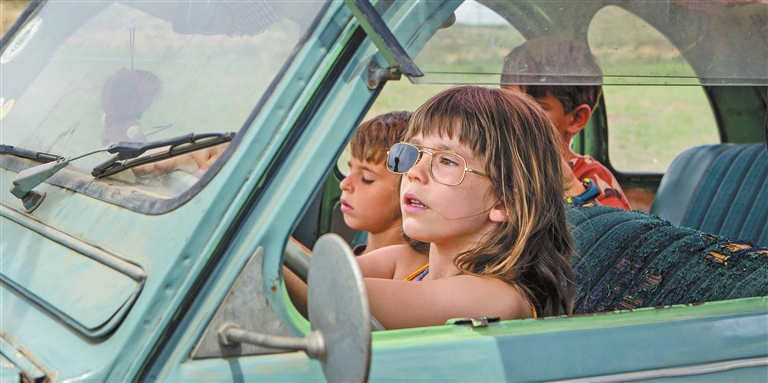
Directed by Carla Simón, the film is named after the village in northwestern Spain where the Catalan director’s people have cultivated peaches for generations; it’s cast with nonprofessional actors whose deep roots in that agrarian culture inform their natural performances. This is a heartfelt drama about the wrenching clash between traditional agriculture and industry. The prevailing mood is one of melancholy for a way of life under threat and stability suddenly upended. But that sadness is tempered throughout by gratitude for the beauty and bounty of land whose people are no less nurtured by the soil and the sun than the orchard they tend, with row upon row of leafy trees yielding their succulent fruit at the foot of rocky hills. Simón lulls us into a false sense of happy harmony by opening with three kids, Iris (Ainet Jounou) and her twin cousins Pere and Pau (Joel and Isaac Rivera), playing a spaceship game in a broken-down car, left to rust away in an outer field. But when a crane appears to tow the wreck, we learn that the Solé clan, who have farmed the property since the Spanish Civil War, are on borrowed time. The landowner, Pinyol (Jacob Diarte), has made an agreement with an alternative energy company to replace the trees with solar panels, and the family is to be evicted. The sweet but weak Solé patriarch, Rogelio (Josep Abad), still believes that a spoken agreement with Pinyol’s ancestors seals their rights, and trying to stop his family’s removal with gestures like a basket of fresh-picked figs. His son-in-law Cisco (Carles Cabós) and his wife Nati (Montse Oró) are more pragmatic, already cozying up to Pinyol for employment and causing a rift in the family. The anchoring center of the ensemble is Rogelio’s son Quimet (Jordi Pujol Dolcet), whose debilitating back pain is the result of decades of field work. He accepts his family’s fate with proud indignation, throwing all his energy into drawing maximum yield from the final harvest. That means relying less on migrant workers and leaning more on his teenage children Roger (Albert Bosch) and Mariona (Xènia Roset) for labor. Quimet’s wife Dolors (Anna Otín) manages to keep the loving but quarrelsome family together, as does his sister Glòria (Berta Pipó). The signs of a shift away from the family’s roots are already evident in rebellious Roger, secretly cultivating cannabis plants with Uncle Cisco in the shade of taller crops, and Mariona, rehearsing a dance routine with her friends to perform at the village fiesta. But neither of the adolescents is untouched by the sobering threat of change. Roger vents his anger dancing or shooting the wild rabbits that infest the fields, eating their crops; he and Mariona show their disgust one night by leaving a bloodied heap of dead bunnies on Pinyol’s doorstep in town. Their younger sister Iris weaves among the trees and the fruit-pickers in seemingly carefree play every day, but the tensions rippling through her family are not lost even on the youngest children. The hold of the earth on the Solés is never in doubt, and the inevitability of their fate is sadly indicated throughout by the constant arrival of delivery trucks and the initial stages of solar panel installation on the land bordering the orchard. The devaluing of history is symbolized by Pinyol’s indifference to the fact that his wealthy family was hidden and protected during the war by the Solés. Rendered powerless to stop the cruel hand of progress, the family acknowledges their suddenly uncertain future while drawing whatever fortification they can from the land that’s nourished them. This is most evident in Quimet. Watching him arrange snails on a grill and cover them with dried grass to be smoked and eaten at a big, happy family lunch where everyone ends up in the pool is just one example of his appreciation for the life that has sustained them. His tears when his impatience costs them a part of the harvest carry a real sting, and his exultant win in a wine-guzzling contest at the town festival gives him a moment of relief, a victory in the face of defeat.(SD-Agencies) | 
